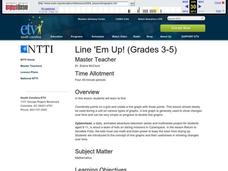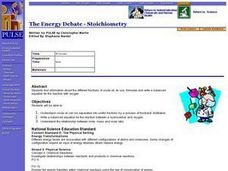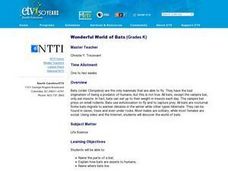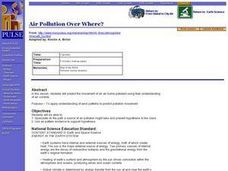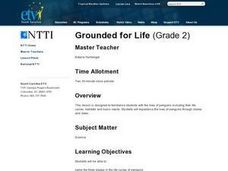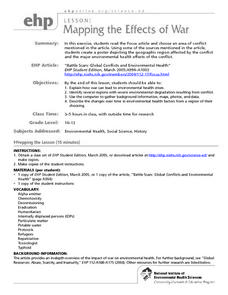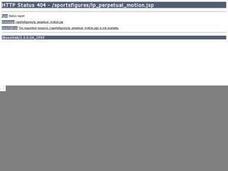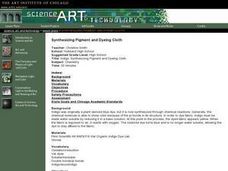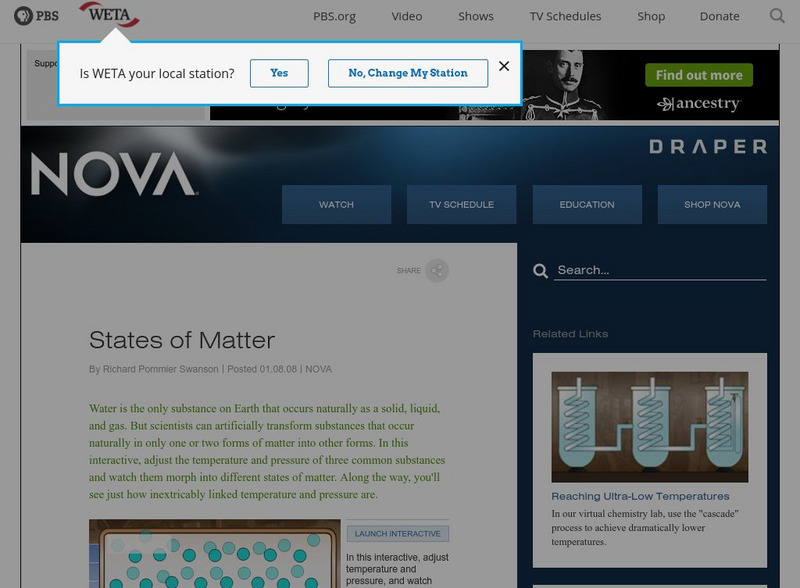Curated OER
To Float or Not to Float - A Lesson on Density
Students observe and experiment with the concept of density. This is done using a simple experiment that helps them to apply scientific principles of observation and proving a hypothesis.
Curated OER
Depth Line
Students use adding machine tape to plot increasing ocean depths and deep sea historical events.
Curated OER
Line 'Em Up!
Students find coordinate points on a grid and create a line graph with those points. This lesson should ideally be used during a unit on various types of graphs. They make and use coordinate systems to specify locations and to describe...
Curated OER
Blame It On El Nino
Learners understand what the weather phenomenon El Nino is and what causes it. Students recognize how remote sensing technology can detect and predict El Nino. Learners discover how El Nino effects weather conditions throughout the globe...
Curated OER
The Dirt on Worms!
Fourth graders make predictions, observe, collect and record data. They investigate several soil and worm websites. Finally, 4th graders write a letter to The President which defends earthworms by explaining their value to the United...
Curated OER
The Energy Debate - Stoichiometry
Students determine crude oil can be separated into useful fractions by a process of fractional distillation. They write a balanced equation for the reaction between a hydrocarbon and oxygen.
Curated OER
Wonderful World of Bats
Students create a book about bats. They write a letter to a scientist containing questions about bats. They compare the socialization of bats to humans; compare the needs of bats to humans and other animals.
Curated OER
Air Pollution Over Where?
Young scholars predict the movement of an air borne pollutant using their understanding of air currents. They determine which governments and/or communities should be contacted to be forewarned. They also explore the properties of their...
Curated OER
Streamflow
Learners discuss the topic of streamflow and how it occurs. They take measurements and analyze them. They interpret data and create their own charts and graphs.
Curated OER
Grounded for Life
Second graders become familiar with the lives of penguins including their life cycles, habitats and basic needs. Students will experience the lives of penguins through stories and video.
Curated OER
Erosion: On the Move...Defending the Coast Against Wave Attack
Students study how people have tried to save beaches from wave erosion. They examine what has occurred to Cape Hatteras as a result of beach erosion and the efforts to reduce the erosion.
Curated OER
Root, Root, Root for the Nutrients
Students observe the growth of a seed, predict what will happen when seeds are planted without soil, and conduct an experiment using a hydroponics system.
Curated OER
At Play with Applique
Young scholars apply an applique after learning about the process. Students accurately baste the appliques to the background fabric and hold them securely during the needle turn process.
Curated OER
Octopus Legs
Students have oceans of fun transforming a wienie into an octopus they can eat! After counting, cutting halves and fourths, observing steam and the effects of heat, they mix colors as they create a yummy dipping sauce from mustard and...
Curated OER
Mapping the Effects of War
Students examine how war can lead to environmental health crises. They read an article, conduct research on a region from the article, and create a poster to depict the geographic region and the environmental health effects of the conflict.
Curated OER
Separating Soup Mix
Students use screens of three sizes to separate a mixture of five solid materials. They plan and conduct simple investigations using appropriate tools, measures, and safety rules and record and report observations, explanations, and...
Curated OER
Rock Crystallization
Students determine the differences between the crystallization of igneous and metamorphic rocks. They examine both liquid state and solid state crystallization.
Curated OER
Perpetual Motion
Students discuss movement of air currents and then experiment to create visible models of air currents. Students connect the model to weather patterns.
Curated OER
Environmental Education
Second graders examine how their choices affect the environment. They identify different types of pollution and its source. They ask questions to end the lesson.
Curated OER
Synthesizing Pigment and Dyeing Cloth
Students create a synthetic dye and oxidize the dye and record the effects.
Curated OER
Lake Superior Ecology Unit
Sixth graders research Lake Superior and its ecosystem. Students investigate the lake's cycles of mixing and stratification and how these cycles affect the biology of the lake. This lesson plan contains five days of activities.
American Chemical Society
Middle School Chemistry: Changing State: Melting
Discover the concept that energy transfer and molecular motion cause the change in state from a solid to a liquid. Also compare state changes of water to the state changes of other substances.
PBS
Pbs: Nova: Absolute Zero: States of Matter
This interactive allows you to explore the effect that temperature and pressure have on the changes in the states of matter. You can test these variables on carbon dioxide, hydrogen and water.
University Corporation for Atmospheric Research
Ucar: Just a Phase: Water as a Solid, Liquid, and Gas
This site helps students construct a model of the arrangement of water molecules when present as solid, liquid or gas. Includes background information, lesson plans, links to standards and assessment ideas.




